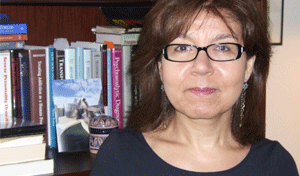She Lays Relationships on The Table
- Written by Melda Akansel
- Published in Health
By Melda Akansel - Psychologist Semra Çoşkuntuna, who came to the United States to do her PhD, solves the problems of individuals living the tiring and fast-paced life in New York. “The biggest problem for people here is loneliness,” says Çoşkuntuna, who specializes in solving relationship problems.

Semra Coskuntuna. (Photo by Melda Akansel)
fter completing her psychology training at Hacettepe University, Semra Çoşkuntuna came to the United States in 1976 to do her PhD. Çoşkuntuna started her doctoral program in experimental psychology but then took a hiatus to enter the professional field. Not finding what she was looking for, she then decided to change her doctorate to one in clinical psychology because, as she says, “I like working with people more.” After completing her training, she opened her own clinic in Manhattan and has since been working as a clinical psychologist for the past fifteen years.
Speaking of her general patient population, Çoşkuntuna says, “Usually people come to me because they have trouble with life. They come looking for solutions to either their personal or work problems.” According to Çoşkuntuna, problems that have existed from before or that have not been solved becomes a barrier after a certain age. In these situations people have difficulties in achieving what they want or in succeeding. They do not see their own potential or they feel that something is missing in their lives. Couples and relationship problems are also part of Çoşkuntuna’s practice. “I do not work with families, but I do work with couples,” she says as she underlines the importance of relationships between two people. Semra Çoşkuntuna also provides therapy for her own colleagues. “In this field we also need to understand our own problems and our feelings. If I do not know myself or if I can’t express my feelings then I cannot help anyone else. That is why we generally go to therapy as well.” As a psychologist, Semra Çoşkuntuna, who works in New York, says that she has patients from all countries and that she works with every age group except for children. The average age group of her patients is between 22 and 50. Her youngest patient to date was 17 and her oldest was 82.
Semra Çoşkuntuna says that compared to other nationalities, she does not have that many Turkish patients. She explains this by saying that Turkish people generally try to solve their problems themselves. Her Turkish patients usually come to her with relationship problems. “Turkish patients usually call me because of relationship problems that they are having. They also come frequently after having their first child in their marriage, saying that ‘their nerves are shot’.”
Semra Çoşkuntuna decided to come to the United States to further her education and says that she has reached most of her career goals in the past thirty-one years that she has been living here. Çoşkuntuna had at first thought that she would be returning to Turkey after graduating but then, after starting her practice, she said that with time leaving became a harder and harder decision. Even though she has become used to the United States and to living here she does say that she still does not feel that she completely belongs: “I do not feel myself at home here one hundred percent but also each time I go back to Turkey I also do not feel that I completely belong there either. However this feeling helps me with my work. I am able to look at things from two different points of view.” Being between two different cultures is an advantage for her. It helps her when she is working with people from a different culture and she feels that she is able to understand them better. Çoşkuntuna says that people who come to her for therapy also feel much more comfortable due to this.
LONELINESS IS THE BIGGEST PROBLEM
Semra Çoşkuntuna states that the biggest problem for a foreigner living in the United States is loneliness. Even though not knowing the language causes many problems, she says the real problem is the difference in the cultural language. Çoşkuntuna says: “Knowing English does not always solve everything when it comes to communicating. Even a person who is here studying English can find this very difficult. It is very difficult for a person to think outside of their culture and therefore it is very hard for them to understand another person’s behavior. For someone who has recently arrived it is very difficult to leave their surroundings and their lives, to then come here and gain new habits and to interact with people from other cultures and it takes time to understand their behaviors and all of this reflects on their relationships.”
Last modified onSaturday, 06 May 2017 10:07
Tagged under








